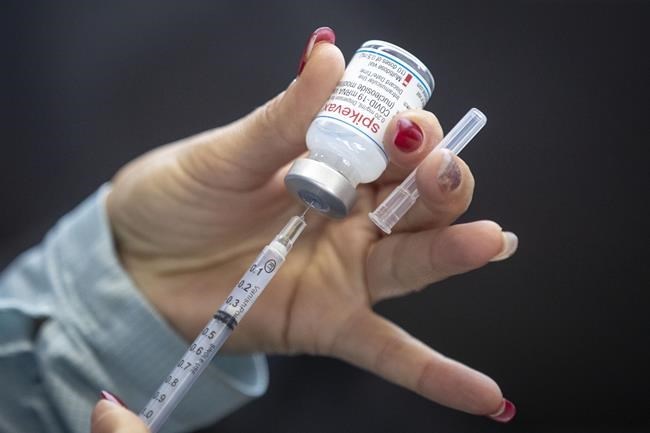ST. JOHN'S, N.L. ŌĆö Newfoundland and Labrador has become one of the latest ŌĆö and last ŌĆö provinces to expand access to a second COVID-19 booster as the BA.5 Omicron subvariant fuels a summer surge.
Dr. Janice Fitzgerald, the province's chief medical officer of health, announced Wednesday that the province was lowering the minimum age for a second booster to 50 from 70. Residents must wait at least 20 weeks from their previous dose to be eligible.
She urged residents to carefully consider the timing of their fourth shot, as well as their risk factors for contracting a severe case of COVID-19.
"We know that three doses of the vaccine are quite good at protecting against severe disease, even six months from your last dose," Fitzgerald told reporters in St. John's. "And while COVID-19 is circulating now, we anticipate that there will be another increase in cases in the fall as people move inside."
New vaccines specifically targeting the Omicron variant may be also be available in the fall, she added.
Newfoundland and Labrador is the last Atlantic Canadian province to expand second-booster eligibility. New Brunswick announced Tuesday that it would offer second boosters to everyone aged 18 and older. Prince Edward Island offers second boosters to everyone aged 12 and older, and Nova Scotia ŌĆö like Newfoundland and Labrador ŌĆö offers them to anyone over 49.
Ontario also announced Wednesday that it was expanding fourth-dose eligibility to everyone 18 and older. Alberta, meanwhile, restricts access to those 70 and older, according to the Alberta Health Services website.
Fitzgerald said that like many other provinces, Newfoundland and Labrador is seeing an increase in COVID-19 activity, likely driven by the highly contagious BA.5 Omicron subvariant. Hospitalization numbers are expected to climb, and they'll likely peak in the next few weeks, she said.
In the meantime, the province is maintaining its requirement that all those who test positive for the disease isolate for seven days.
Fitzgerald reminded residents they can protect themselves against infection by wearing masks and spending time outside, where transmission is less likely. She also urged people to be sure they have all their vaccines, adding that the province is moving away from considering those who've received their first two shots to be fully vaccinated.
"I know it has been a long two years and we're all very tired of COVID," Fitzgerald said. "Still, we have to remain vigilant and do what we can to live with COVID-19."
This report by The Canadian Press was first published July 13, 2022.
Sarah Smellie, The Canadian Press



